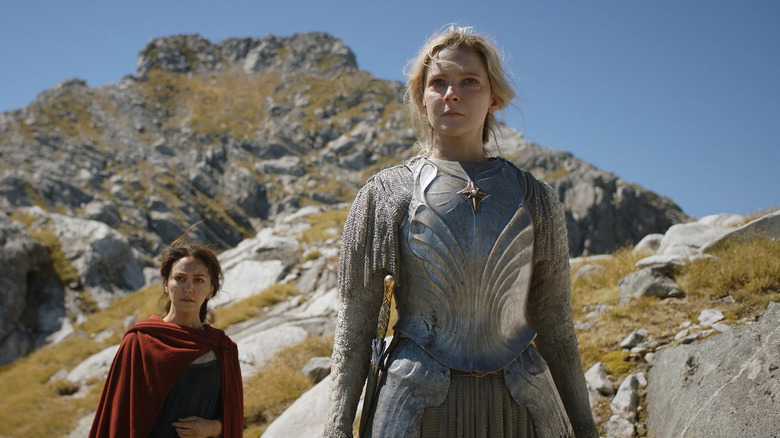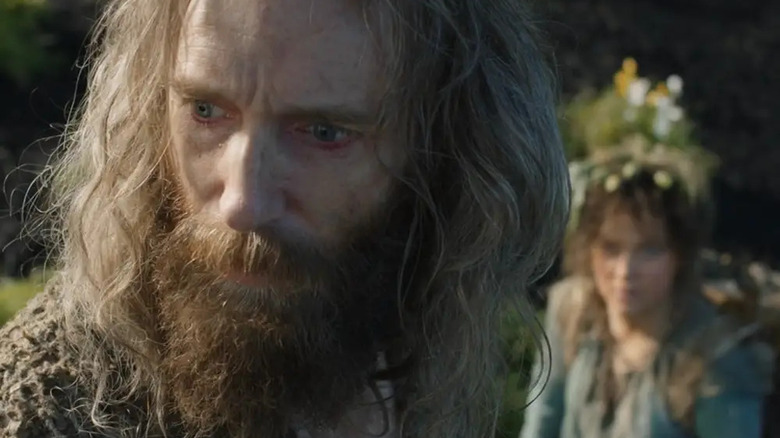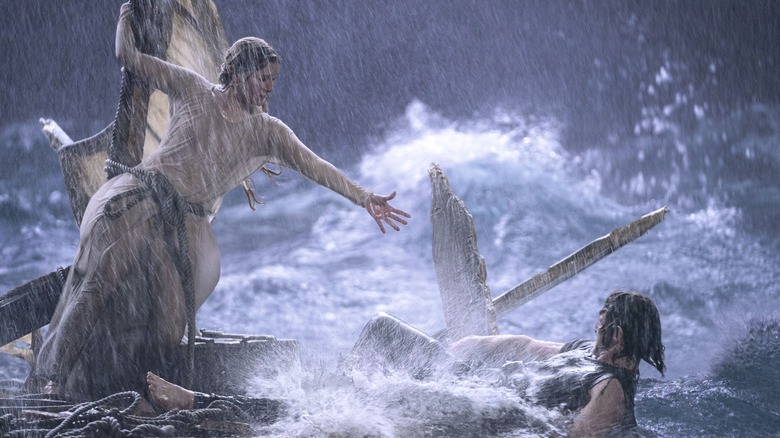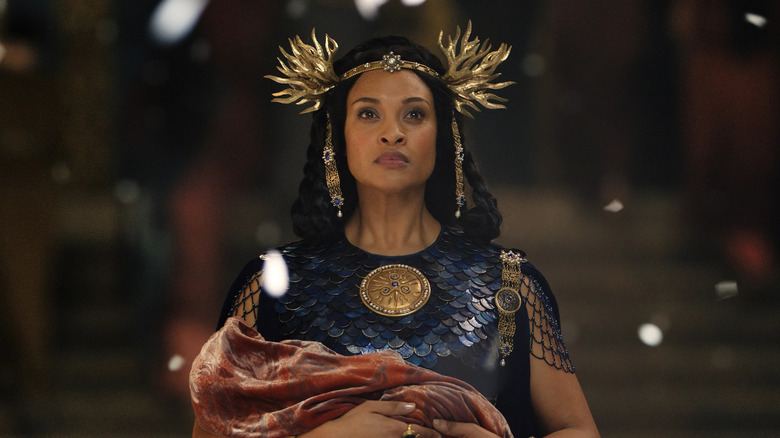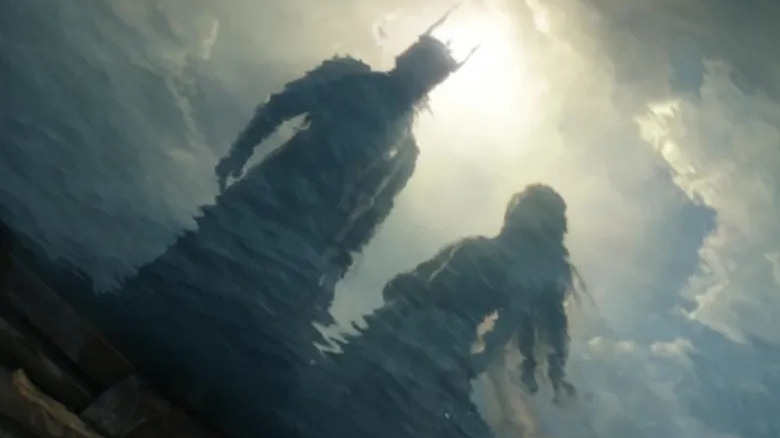Lord Of The Rings: The Rings Of Power Spoiler Review: All Plots That Wander Are Not Lost
There's been a longstanding debate, before even the first episode of Amazon's "The Lord of the Rings" prequel series aired: Is "The Rings of Power" Tolkien enough? J.R.R. Tolkien's "The Lord of the Rings" is a masterstroke of high fantasy writing, a cornerstone of the genre, a paragon of world-building, and one of the most wildly influential series of all time. Most of, if not all, contemporary fantasy series owe a great deal to Tolkien, whose influence can be seen in everything from "Game of Thrones," to Hayao Miyazaki films, to "Harry Potter." His contribution to literature and pop culture is undeniable. But, depending on who you ask, the definition of what makes something Tolkien-esque changes.
Is it Tolkien's ardent environmentalism? His real-world experiences in war which left him processing his trauma through a quietly cynical fantasy saga? His academic approach to world-building? And if so, why did "The Rings of Power"— whose steady (if stumbling) storytelling, lovingly crafted characters, and distant sense of doom and melancholy were all true to the Tolkien ideals — fail to live up to these aspects for so many?
The truth is, the big hurdle that "The Rings of Power" had to overcome was not Tolkien, but Peter Jackson. His "The Lord of the Rings" film trilogy is considered the definitive adaptation of Tolkien's works, though he took a fair few creative liberties himself. So "The Rings of Power" may indeed have shot itself in the foot by tying itself so closely to the Jackson trilogy, even if its changes to "canon" are no more radical than Jackson's "Lord of the Rings" and "Hobbit" movies (nor that different an approach as that of another highly acclaimed concurrently airing fantasy show).
So when you strip away all the expectations — from Tolkien fans, from Peter Jackson fans, even from "House of the Dragon" fans — at the end of the day, is "The Rings of Power" great TV? Maybe not, but it is great Tolkien.
This wandering day
The biggest criticism that the show has received has been for its bloated ensemble and meandering storylines — a few of which still had not come to a satisfying conclusion by the time the season finale aired. And on purely a TV storytelling level, it's a fair criticism: "The Rings of Power" was simply not adept at juggling those multiple storylines, undercutting the momentum of some of their strongest plots and giving far too much screentime to characters that are honestly a bit of a snooze. It's the exact opposite approach of what Tolkien did so strongly with both "Fellowship of the Rings" and "The Hobbit," where he started small (literally), in the POV of a halfling before expanding the cast of characters and splitting them into multiple storylines. "The Rings of Power" started big, taking its cues from "Game of Thrones" and modern fantasy TV, which are a different beast than Tolkien's fantasy — driven by character drama rather than big sweeping sagas about the battle between good and evil.
But there was one way that this ambitious approach worked for "The Rings of Power": It lets us be in the world that Tolkien lovingly crafted and that showrunners J. D. Payne and Patrick McKay poured a lot of money into bringing to life. We get to spend hours watching Nori (Markella Kavenagh, the charming MVP of the series) and The Stranger (Daniel Weyman, who feels like he fell right out of some ancient high fantasy book) timidly grow their friendship as they and the harfoots (the perfect representation of Tolkien's mundane, awe-inspiring magic) wandered the vast lands of Middle-earth.
We get to see Elrond (Robert Aramayo) and Prince Durin (Owain Arthur) repair a friendship damaged by eternity. We see humans court their own doom in the Southlands and Númenor. We see "The Rings of Power" throwing in another conflicted elf-human romance between Aronidir (Ismael Cruz Córdova) and Bronwyn (Nazanin Boniadi). And best of all, we see Galadriel (a tremendous Morfydd Clark) wrestle with the darkness within her while unknowingly flirting with darkness in the form of Halbrand (Charlie Vickers, sneaking in a great, sinister performance).
Now, this may be antithetical to TV, a form that is so plot and character-driven, but it is fitting for a Tolkien adaptation. As a show, "The Rings of Power" may feel clunky, but it also feels big, majestic, immersive, and somehow, comforting. And while the characters may wander in paths that feel like they have no clear direction, you can still be sure there's a grand scheme at play and a great battle of wills taking place in even the smallest character interactions. That's Tolkien in a nutshell.
Call it a gift
But "The Rings of Power" couldn't resist employing another frequently mishandled TV trope: the mystery box. The great mystery of Sauron overshadowed the series, to the point that its weekly conversations could be whittled down to "who is Sauron?" But as frustrating as this could be, it's not an error made on the show's part. Sauron, the great representation of evil in Tolkien's lore, is also known as The Deceiver (one of the ancient being's many epithets) — who spends eons manipulating men and elves for his own gain — so in our modern storytelling language, it makes sense that the best TV equivalent would be the dreaded mystery box.
Despite the frustrations of the mystery box, and the obviousness of Sauron's identity, it's still astonishing how satisfying his unmasking plays out. It works on several levels: in the subtle hints to the longtime Tolkien fans ("Call it a gift") and in a betrayal that works both textually and subtextually. We as TV viewers know not to trust Halbrand when we first meet him — he's dark, brooding, cagey about his past, and a little too good-looking. But Galadriel's determined belief in him, their shared battles in Númenor and the Southlands, and their intense connection, give the audience reason to trust him — which is what makes his turn exceptionally good.
Payne, McKay, and co., are smart, playing into our expectations of Halbrand, playing against it, and ultimately making Sauron's deception one that works with both Galadriel and the audience — all while he never actually tells a lie. It's one of the times that the TV form works to "The Rings of Power's" benefit, even if it may make Tolkien purists seethe at the possibility of framing Sauron as an antihero. While it may feel like it leans too heavily on the easy trope of the homme fatale (the Dark Lord is a handsome bad boy), it's a smart way of translating some of Tolkien's more alienating aspects — all-consuming evil is hard to write for TV — for a modern audience.
Númenor's slow drowning
I'll be the first to admit that the Númenor stuff is a bore. It sticks out like a sore thumb amid the more familiar Tolkien comforts, because it's so purely human. The back alley fights, the political scheming, the family squabbles, the Rome-meets-Atlantis omens. Though Númenor looms large in "The Lord of the Rings," its strength was always in its legacy — the idea that great battles take place among the ruins of fallen, towering civilizations.
Tolkien's Middle-earth is one besieged by war and evil, influenced by the writer's bleak experiences fighting in the first World War, with light and good barely winning out at the end of the day — for an all-too-brief, beautiful time. In Tolkien's world, evil will always be lapping on our heels, and all we can do is keep it at bay. The most interesting thing is seeing the ruins of great civilizations before that have fallen to this evil — and how history repeats itself amid those ruins. So when we see that great civilization itself, it's kind of dull.
The Númenor storylines have a few standouts in Elendil (a perfectly cast Lloyd Owen, gravitas falling out of his butt), the ancestor of Aragorn, and Númenor's Queen Regent Miriel (Cynthia Addai-Robinson), plagued by visions of her kingdom's downfall. Unfortunately, when the show attempts too hard to sow the seeds for disaster in the political schemes of Pharazôn (Trystan Gravelle) or the brash ambition of Isildur (Maxim Baldry), it falls flat.
Touch the darkness
One of the greatest inventions on the show's part is the conflict of Galadriel. Depicted in "The Rings of Power" as an abrasive, relentless warrior whose quest to vanquish evil might have begun to transform her into the very thing she's fighting, Galadriel unexpectedly becomes the greatest representation of the eternal battle between good and evil that is synonymous with Tolkien. It's not a characterization that is out of nowhere either — Tolkien texts have described Galadriel as having fled Valinor to Middle-earth out of a desire to rule the realms herself. "The Rings of Power" have only changed her story from one of ambition to one of righteous vengeance.
"There is a tempest in me!" she declares to the queen regent when she arrives on the shores of Númenor with the aim of amassing a new army after her's had been taken away by her fellow elves. She's consumed by revenge, and ironically, it's only after Halbrand holds her back that she begins to see more clearly. Tolkien purists may pooh-pooh at making Galadriel's temptation by Sauron the climax of the first season, but there's a reason that the lure of the dark side is such a classic conflict. It's a standard of modern fantasy and sci-fi, and goes back to antiquity. And yes, it's embedded in Tolkien's works, though said works are more abstract and inevitable — Men will always be doomed to darkness.
That's why it's so interesting here to see this conflict of light and dark play out in our Lady of Light and our Dark Lord, two who bring out the worst in each other — Galadriel who accidentally convinces a "repentant" Sauron to fight for meaning again, and Sauron who sees a kindred spirit in Galadriel.
But despite the darkness that is so prevalent in Tolkien's works, "The Rings of Power" understands that there will always be light at the end of the tunnel. Galadriel refuses her temptation, and on the other side of the world, The Stranger realizes: "I am good." The joy of watching "The Rings of Power" is in seeing how that good will out against the forces of darkness that Middle-earth is doomed to be consumed by. It's the beauty of the prequel: there is an unspeakable dread with every bit of foreshadowing that takes place, and every triumphant moment is marred by the knowledge that it's all too temporary.
It's a feeling in keeping with Tolkien, who himself undercut the victory of "The Return of the King," with the Scouring of the Shire — an epilogue that saw our conquering heroes return to a home reduced to ash. War and evil will always linger, but at least there's good in the world that can give us our brightest and most comforting moments. And "The Rings of Power," in its slow, steady journey towards doom, gives us those.
